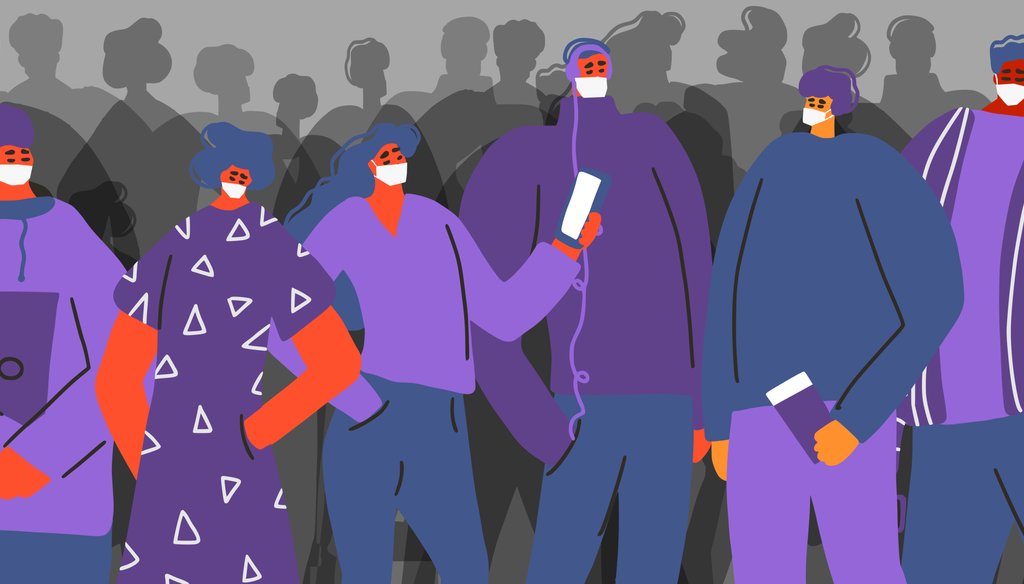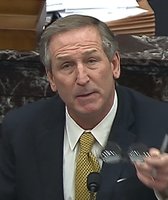Get PolitiFact in your inbox.

(Shutterstock)
Fact-checking your friends and family on social media is not as weird as you think — and it could help slow the spread of misinformation about the coronavirus.
A recent survey found that 34% of people reported seeing someone else get corrected for sharing about COVID-19 on social media. Nearly one-fourth of respondents said they had fact-checked coronavirus misinformation themselves, and more than two-thirds agreed that people should respond when they see someone sharing false claims.
This is good news — research shows that, when people correct misinformation on their social media feeds, misperceptions decrease. For coronavirus-related falsehoods, correcting the record is even more important.
Since the pandemic began, PolitiFact has fact-checked several inaccurate claims about how to prevent or treat COVID-19. Many of them are dangerous, such as the bogus claim that drinking bleach can destroy the virus or that wearing a mask in public is harmful. If taken seriously, that kind of misinformation could have dire health consequences.
To make swatting down falsehoods a little easier for everyone, we created a guide for how to fact-check your friends and family on the coronavirus pandemic. Below are six tips to make your timelines a little more truthful.
When you see someone you know share something false about the coronavirus, take the matter seriously. Health misinformation has the potential to cause harm.
"In the middle of a pandemic, personal choice is inherently tied up in community. Every choice I make about being more safe and more risky has implications not just for me, but for a lot of other people," said Emily Vraga, associate professor of journalism at the University of Minnesota. "That makes it more important that we do correct other people."
Even though it may feel like a small action, fact-checking social media can make a difference. A study Vraga co-authored in 2017 found that corrections can decrease health misperceptions online — even among the most ardent conspiracy theorists. This is especially true when you fact-check someone you know.
"For conspiracy theories this can actually be easier," said Drew Margolin, an assistant professor of communication at Cornell University, in an email. "It's often the case that the theory is really a way of communicating distrust in a particular individual or entity. This is why the theories adapt so easily — they are motivated by distrust, not specific facts."
In short: facts matter, and anyone can wield them to correct misperceptions about the coronavirus.
Once you’ve decided that you want to correct someone, the next step is to think about how you’re going to do it. The goal is to convey accurate information in an analytical, scientific way — not make people mad or prove that you’re smart.
"Try to avoid provoking them to defend themselves," Margolin said. "This means either not embarrassing them — such as doing it in private — or, possibly, correcting diplomatically in front of others so that they do not lose face."
When people feel attacked, they may think their worldview or reputation has been challenged. That leads to less analytic thinking, Margolin said, making a fact-based discussion much harder.
RELATED: 7 ways to avoid misinformation during the coronavirus pandemic
Whether you correct someone in a private message or in front of others depends on the person. If you think they won’t react well to a public correction, it’s fine to reach out directly, especially if you want to preserve that relationship. But researchers say there’s a benefit to fact-checking someone in front of other people.
"Social media actually makes it more important that we’re willing to engage in those corrections because we know other people are going to see it, and we want to make sure that they're not left with the wrong information," Vraga said.
When you’re fact-checking someone, it can help to use language that isn’t too abrasive or belittling. A gentle approach can help the person you’re correcting see that you have their best interest at heart.
"Particularly if it’s a family member or a friend, there are also other things you might want to consider than just encouraging belief change," said Briony Swire-Thompson, a postdoctoral researcher at Northeastern University's Network Science Institute. "You might want to give the correction in a kind way, just because no one wants to be wrong."
But that’s not always the case — how you phrase a fact-check depends on the person you’re correcting. Preliminary research from Vraga, Leticia Bode of Georgetown University and Melissa Tully of the University of Iowa suggests that corrections are good at changing misperceptions regardless of their tone.
"When you correct someone, the correction works equally well when it’s uncivil or neutral," Vraga said. "You can use the language you think is most appropriate. Maybe a snarky tone is appropriate for that relationship."
Regardless of how you speak to the person you’re correcting, experts agree that compassion is key. Try saying things like "I was confused, too" or "I understand why you shared this."
"You can refute the hoax but acknowledge the validity of the concern," Margolin said.
When writing your fact-check, try to emphasize what’s right instead of what’s wrong. This works two ways.
First, focusing on the facts could resonate more with the person you’re correcting, as they may feel less attacked. Second, research shows that, the more people hear a false claim, the more it resonates with them — even if it’s presented alongside a correction.
"Repeating the misinformation is the biggest thing that we really need to be careful about," Vraga said. "The more we hear something the more we think it’s true."
RELATED: Top 10 uncertainties about the coronavirus
Instead of repeating the false claim, try using just a link to refer to it. Or speak about it in vague terms, such as "I saw your post about wearing masks." The goal is to get to your correction as quickly as possible.
"Clarity is certainly one of the main goals," Swire-Thompson said. "If you make it really wordy and complicated so that no one reads it, or when you bury the corrective element in a way that people just kind of skim past it, it can be less effective."
The backbone of any fact-check is its source list. The same goes for corrections on social media.
One 2017 study found that corrections of misinformation about the Zika virus were more effective when a source was provided. Fact-checks are even more effective when they come from expert sources like the Centers for Disease Control and Prevention or the World Health Organization, which maintains a list of debunked coronavirus myths.
However, experts say the kind of source you use should depend on the person you’re correcting. Try to find a credible source that the person respects.
"If you can debunk misinformation using Fox News and this is a Fox News user, you should try to do that," Vraga said. "Think about who are the sources they’re going to trust. If they’re not going to trust the CDC, maybe go to your local health organization."
Don’t rely on a single link to correct someone, either. Experts say two sources are better than one.
"It's not exactly clear why this is, but one theory is that it helps people identify relevant information to reconstruct their understanding, rather than just telling them to excise some specific beliefs from their knowledge, leaving it with weird holes," Margolin said. "Another possibility is that it's harder to attack the source when there are many sources."
When in doubt, try linking to articles from independent fact-checking organizations. They’ve debunked more than 6,000 claims about COVID-19 around the world.
This tip holds true when fact-checking any kind of misinformation, whether it has to do with health or politics.
A 2017 study found that, when people were presented with a fact-check correcting a falsehood, they changed their belief in the claim. That finding held across party lines. However, the study noted that corrections did not change people’s voting patterns.
In short: fact-checking changes specific ideas, not votes — a finding that is echoed by other studies on the effect of corrections.
RELATED: 7 steps to better fact-checking
"In the context of the coronavirus, a common subtext is President Trump," Margolin said. "If this is an ongoing struggle you are having with a family member, and you'd like to correct them, find a way to defuse this point."
A good way to do this is going back to tip No. 4: Focus on the facts. Research shows that fact-checks can decrease health misperceptions, but it’s much harder to change the way people think or see the world.
"Frames that focus on the falsity/misleading nature of just the claim itself, without forcing substantial bigger changes, will work better," Margolin said. "Avoid frames that make it seem like a struggle between you and them for power or reputation. These only make people more resistant."
Our Sources
Email interview with Drew Margolin, assistant professor of communication at Cornell University, May 21, 2020
Health Communication, "See Something, Say Something: Correction of Global Health Misinformation on Social Media," June 16, 2017
Information, Communication & Society, "I do not believe you: how providing a source corrects health misperceptions across social media platforms," Nov. 14, 2016
International Fact-Checking Network, Fighting the Infodemic: The #CoronaVirusFacts Alliance, accessed May 22, 2020
Interview with Briony Swire-Thompson, postdoctoral researcher at Northeastern University's Network Science Institute, May 21, 2020
Interview with Emily Vraga, associate professor of journalism at the University of Minnesota, May 21, 2020
Journal of Experimental Psychology, "Prior exposure increases perceived accuracy of fake news." 2018
Political Behavior, "The Elusive Backfire Effect: Mass Attitudes' Steadfast Factual Adherence," Aug. 6, 2016
PolitiFact, "Fact-checking COVID-19 prevention, treatment myths," March 26, 2020
PolitiFact, "Here’s how to fact-check your family at the Thanksgiving dinner table," Nov. 25, 2019
PolitiFact, "No, drinking bleach will not ward off coronavirus," Jan. 30, 2020
PolitiFact, "There’s no evidence that wearing standard masks is harmful to your health," May 19, 2020
Poynter, "Fact-checking changes minds but not votes, according to new research," March 1, 2017
Poynter, "Study: On Twitter, you’re better off fact-checking your crazy uncle than a complete stranger," Sept. 11, 2017
PsyArXiv Preprints, "Searching for the backfire effect: Measurement and design considerations," May 14, 2020
Science Communication, "Correcting Misinformation About Neuroscience via Social Media," Nov. 26, 2019
Science Communication, "Using Expert Sources to Correct Health Misinformation in Social Media," Sept. 14, 2017
The Washington Post, "Americans are fighting coronavirus misinformation on social media," May 7, 2020
World Health Organization, "Coronavirus disease (COVID-19) advice for the public: Myth busters," accessed May 22, 2020






























